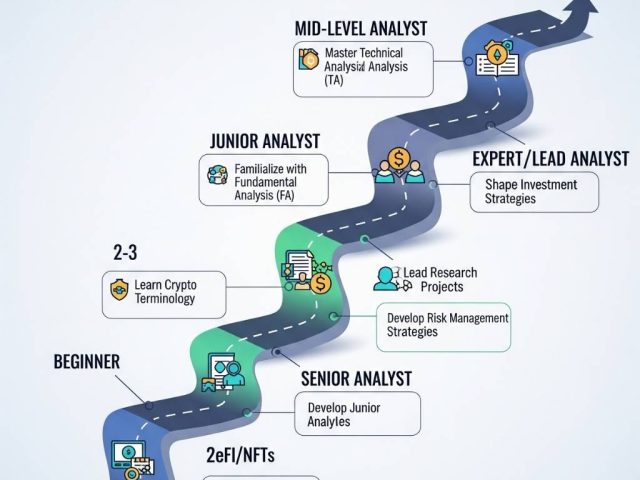The Role of Crypto in Personal Finance: Planning for the Future
In the dynamic landscape of personal finance, a new player has emerged, captivating the attention of investors and enthusiasts alike: cryptocurrency. With its potential for high returns, diversification benefits, and innovative applications, crypto is carving a niche for itself in the world of financial planning. But what exactly is crypto, and how can it play a role in securing your financial future? Let’s dive in and explore the exciting possibilities.
Understanding Cryptocurrencies: Beyond the Hype
What are Cryptocurrencies?
At its core, a cryptocurrency is a digital or virtual currency that utilizes cryptography for security. Unlike traditional fiat currencies issued by governments, cryptocurrencies operate on decentralized networks known as blockchains. This decentralization eliminates the need for intermediaries like banks, offering greater control and transparency to users.
The decentralized nature of cryptocurrencies is a key differentiator. Transactions are recorded on a public ledger, accessible to all network participants. This transparency fosters trust and immutability, making it difficult to alter or manipulate transactions. Furthermore, decentralization reduces the risk of censorship and single points of failure, enhancing the resilience of the system.
Volatility and Risk: The Double-Edged Sword
While cryptocurrencies offer exciting opportunities, it’s important to acknowledge their inherent volatility. The price of cryptocurrencies can fluctuate dramatically, leading to potential gains or losses. This volatility stems from various factors, including market sentiment, regulatory developments, and technological advancements. It’s crucial to approach crypto investments with a clear understanding of the risks involved.
“The greatest risk is not taking one.” – Tim Ferriss
Crypto as a Diversification Tool
Reducing Portfolio Risk
One of the compelling reasons to consider incorporating crypto into your financial plan is its potential to diversify your portfolio. Diversification involves spreading your investments across different asset classes to reduce overall risk. Cryptocurrencies, with their unique characteristics and often low correlation with traditional assets like stocks and bonds, can act as a valuable diversification tool.
Correlation with Traditional Assets
Studies have shown that cryptocurrencies often exhibit low or even negative correlation with traditional assets. This means that when traditional markets decline, crypto may remain stable or even increase in value, providing a hedge against market downturns. By including crypto in your portfolio, you can potentially reduce its overall volatility and enhance its risk-adjusted returns.
The Importance of Asset Allocation
When integrating crypto into your financial plan, it’s essential to consider asset allocation. Asset allocation refers to the strategic distribution of your investments across different asset classes. The ideal allocation will depend on your risk tolerance, investment goals, and time horizon. While crypto can offer attractive potential returns, it’s important to maintain a balanced portfolio that aligns with your overall financial objectives.
“Don’t look for the needle in the haystack. Just buy the haystack!” – John Bogle
Crypto for Long-Term Growth
The Potential for High Returns
Cryptocurrencies have garnered significant attention due to their potential for high returns. While past performance is not indicative of future results, some cryptocurrencies have experienced remarkable growth in recent years. This potential for substantial gains makes crypto an attractive option for those seeking long-term growth in their investment portfolios.
The Power of Compounding
One of the most powerful aspects of long-term investing is the concept of compounding. Compounding refers to the process of earning returns on your initial investment as well as on the accumulated returns over time. In the context of crypto, even small investments made consistently over a long period can potentially grow into significant sums due to the power of compounding.
Dollar-Cost Averaging: A Steady Approach
For those wary of market volatility, dollar-cost averaging (DCA) can be a prudent strategy for investing in crypto. DCA involves investing a fixed amount of money at regular intervals, regardless of the market price. This approach helps mitigate the impact of short-term price fluctuations and allows you to accumulate crypto assets gradually over time.
“The best time to plant a tree was 20 years ago. The second best time is today.” – Chinese Proverb.
Crypto for Passive Income
Staking: Earning Rewards for Network Participation
Beyond potential capital appreciation, cryptocurrencies offer opportunities for generating passive income. One such method is staking. Staking involves holding and locking up a certain amount of cryptocurrency to support the operations of a blockchain network. In return for your participation, you earn rewards in the form of additional cryptocurrency. Staking can be a lucrative way to generate passive income while contributing to the security and decentralization of a blockchain.
Yield Farming: Navigating the DeFi Landscape
Another avenue for generating passive income with crypto is yield farming. Yield farming involves providing liquidity to decentralized finance (DeFi) protocols in exchange for rewards. These rewards can come in the form of transaction fees, interest, or newly minted tokens. While yield farming can offer attractive returns, it’s important to understand the associated risks and complexities.
Lending and Borrowing: Generating Interest
Crypto lending and borrowing platforms provide yet another way to earn passive income. You can lend your crypto holdings to others and earn interest on the loaned amount. Alternatively, you can borrow crypto and use it for various purposes, such as trading or investing. However, it’s crucial to carefully assess the terms and conditions of these platforms and understand the potential risks involved.
“Passive income is the key to financial freedom.” – Robert Kiyosaki
The Tax Implications of Crypto
Taxable Events
While the potential benefits of crypto are enticing, it’s important to be aware of the tax implications. Cryptocurrencies are subject to taxation in many jurisdictions, and it’s essential to understand the applicable tax rules in your country or region. Taxable events typically include selling crypto for fiat currency, trading one cryptocurrency for another, and using crypto to purchase goods or services.
Capital Gains and Losses
When you sell crypto for a profit, you may incur capital gains tax. The amount of tax owed will depend on factors such as the holding period, your income level, and the applicable tax rates. Similarly, if you sell crypto for a loss, you may be able to offset those losses against capital gains to reduce your tax liability.
Keeping Accurate Records
Given the complexities of crypto taxation, it’s crucial to maintain accurate records of all your transactions. This includes details such as the date of purchase, the cost basis, the date of sale, and the proceeds. These records will help you accurately calculate your tax obligations and ensure compliance with tax regulations.
“In this world, nothing can be said to be certain, except death and taxes.” – Benjamin Franklin
The Future of Crypto in Personal Finance
Mainstream Adoption
The future of crypto in personal finance holds immense promise. As cryptocurrencies gain wider acceptance and adoption, we can expect to see increased integration with traditional financial systems. This could include the ability to seamlessly pay bills, make purchases, and manage investments using cryptocurrencies. The convenience and accessibility of crypto could revolutionize how we interact with money.
Regulatory Developments
Regulatory frameworks surrounding cryptocurrencies are evolving rapidly. Governments and financial institutions are grappling with how to regulate this emerging asset class while fostering innovation and protecting investors. Clear and balanced regulations could provide greater clarity and legitimacy to the crypto space, further accelerating its adoption in personal finance.
The Evolution of Financial Services
The rise of cryptocurrencies is also driving innovation in financial services. Decentralized finance (DeFi) platforms are offering a wide range of financial products and services, such as lending, borrowing, and trading, without the need for intermediaries. This could lead to greater financial inclusion and accessibility, empowering individuals to take control of their financial future.
“The future of money is digital currency.” – Bill Gates
Mitigating Risks and Ensuring Security
Due Diligence and Research
While the potential rewards of crypto are alluring, it’s crucial to approach investments with caution. Thoroughly research any cryptocurrency or project before investing your hard-earned money. Understand the technology, the team behind it, and the potential use cases. Be wary of hype and unrealistic promises, and always prioritize projects with strong fundamentals and a clear roadmap.
Choosing the Right Exchange and Wallet
Selecting a reputable cryptocurrency exchange and a secure wallet is paramount. An exchange facilitates the buying, selling, and trading of cryptocurrencies, while a wallet stores your crypto assets. Choose platforms with robust security measures, such as two-factor authentication and cold storage options.
Protecting Your Private Keys
Your private keys are the gateway to your crypto holdings. Losing your private keys means losing access to your funds. It’s essential to safeguard your private keys by storing them in a secure location, such as a hardware wallet or a password-protected encrypted file. Never share your private keys with anyone, and be wary of phishing scams and other attempts to steal your information.
“Security is always excessive until it’s not enough.” – Robbie Sinclair
Conclusion
Cryptocurrency represents a paradigm shift in the world of personal finance. Its potential for diversification, long-term growth, and passive income is undeniable. However, it’s crucial to approach crypto investments with a balanced perspective, understanding both the opportunities and risks involved. By conducting thorough research, diversifying your portfolio, and prioritizing security, you can navigate the exciting world of crypto and potentially secure a brighter financial future.
FAQs
What is the best way to start investing in cryptocurrency? The best way to start is by educating yourself about cryptocurrencies and blockchain technology. Choose a reputable exchange, start with a small investment, and consider dollar-cost averaging to mitigate risk.
Is crypto a safe investment? Crypto investments carry inherent risks due to market volatility. It’s important to understand these risks and invest only what you can afford to lose.
How do I choose the right cryptocurrencies for my portfolio? Research different cryptocurrencies, their use cases, and their underlying technology. Consider factors such as market capitalization, liquidity, and community support.
Can I use crypto for retirement planning? While crypto can be part of a long-term investment strategy, it’s important to maintain a diversified portfolio and consider other retirement planning options.
Where can I get more information about crypto and personal finance? Numerous online resources, forums, and communities provide valuable information about crypto and personal finance. Conduct thorough research and consult with a financial advisor if needed.
Scentia Research Group: Your Partner in Blockchain Success
At Scentia, we are passionate about helping blockchain projects succeed. We use our expertise in qualitative research technologies to identify and fix problems that could derail your project. Our team of lawyers, data scientists, and engineers has a deep understanding of the blockchain landscape, and we are committed to providing our clients with the insights they need to make informed decisions.
We believe that blockchain technology has the potential to revolutionize the way we do business. However, we also recognize that there are many challenges that need to be addressed before this potential can be fully realized. That’s where Scentia comes in. We are here to help you navigate these challenges and build a successful blockchain project.





